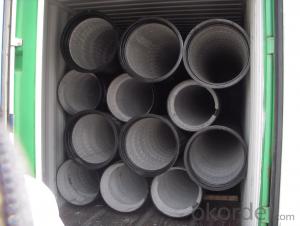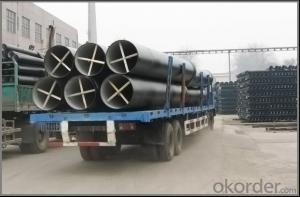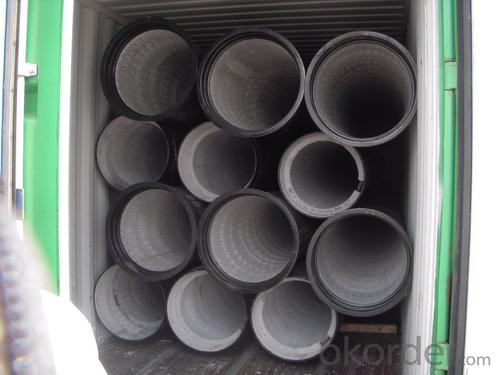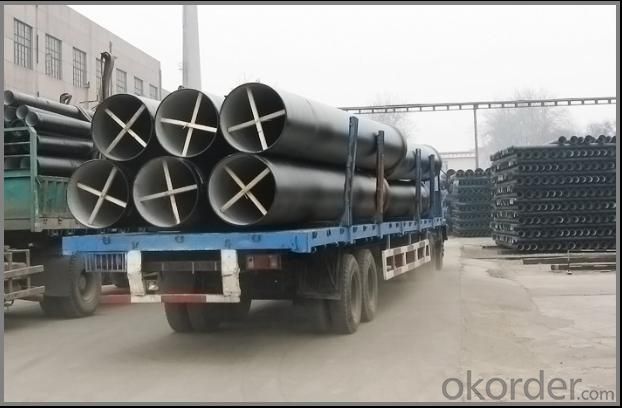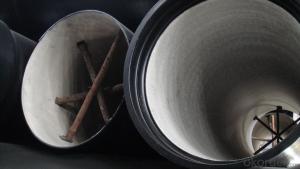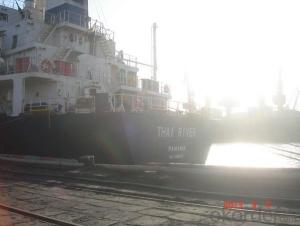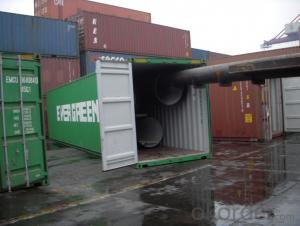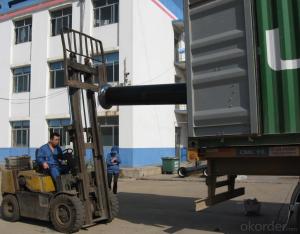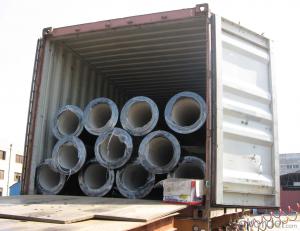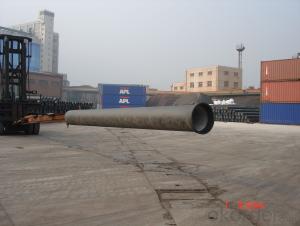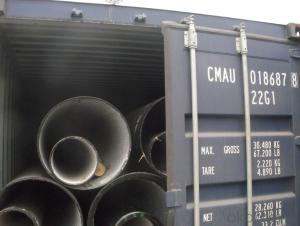DUCTILE IRON PIPE AND PIPE FITTINGS C CLASS DN500
- Loading Port:
- Tianjin
- Payment Terms:
- TT or LC
- Min Order Qty:
- 23 m.t.
- Supply Capability:
- 3000 m.t./month
OKorder Service Pledge
OKorder Financial Service
You Might Also Like
· Material : Ductile Cast Iron
· Size Range : DN 80mm to DN 2000mm
· Unit Effective Length : 6m or 5.7m
· Manufacture Standard: ISO 2531:1998/ EN 545:2006/EN 598:2007
· Annual capacity : 200,000 tons
· Coating Exterior: Zinc 130g/m2 according to ISO 8179-1 and bitumen coating 70 microns.
· Cement Interior: Portland Cement/ High Alumina Cement/ Sulphate Resisting Cement Lining according to ISO 4179
· Special requirements on external coating and internal lining can be applied
· We also provide accessories such as SBR/EPDM rubber gaskets, lubricant paste, pipe caps, PE sleeves, etc.
Additional Parts:
Each pipe is strictly inspected according to related standard to ensure permanently high performance.
Easy Installation at site and service free for life
Long Service Lifespan
Quotation will arrive you within 24hours once we get your inquiry.
We guarantee offering you a competitive price.
A copy of original inspection reports of pipes will be offered after shipment.
- We will follow-up the delivery progress after shipment effect and update to the customer on weekly basis.
- Q: Can ductile iron pipes be used for pressure relief systems?
- Yes, ductile iron pipes can be used for pressure relief systems. Ductile iron pipes are known for their strength, durability, and ability to withstand high pressures. They are commonly used in various applications, including pressure relief systems, where they can effectively handle and dissipate excess pressure to ensure the safety and functionality of the overall system.
- Q: Qianwei County ductile iron pipe which tool to use cutting convenience?
- The cutting of ductile iron pipes is usually done by mechanical cutting, and the working intensity of the machine is stronger than that of our normal workers. This cutting method can effectively reduce the labor intensity of workers, and ensure the quality of cutting. There are many different ways in mechanical cutting, such as sawing, grinding, cutting, and cutting with an electric wire cutter.
- Q: Do ductile iron pipes require external coatings or wraps?
- Ductile iron pipes typically require external coatings or wraps to protect against corrosion. Despite being strong and durable, ductile iron is still prone to corrosion when exposed to specific environmental conditions. Applying external coatings or wraps adds an extra layer of protection, extending the lifespan and maintaining the structural integrity of the pipes. These coatings can vary and may consist of materials like epoxy, polyethylene, or zinc, acting as a barrier between the pipe surface and corrosive elements in the environment. Additionally, wraps made of materials such as polyethylene or polypropylene can provide mechanical protection against impact or abrasion. Therefore, it is generally advisable to apply external coatings or wraps to ductile iron pipes to enhance corrosion resistance and ensure long-term performance.
- Q: What is the expected corrosion protection system for ductile iron pipes?
- Typically, the expected corrosion protection system for ductile iron pipes involves a combination of external coatings, internal linings, and cathodic protection. To protect against corrosion, external coatings are applied to the pipe's exterior surface. These coatings, usually fusion-bonded epoxy, polyethylene, or polyurethane, act as a barrier against corrosion from soil, water, and chemicals. Furthermore, they play a crucial role in prolonging the pipe's lifespan. In order to safeguard against corrosion caused by the transported fluid, internal linings are applied to the pipe's interior surface. These linings, which can be made of cement mortar, epoxy, or polyurethane, provide a smooth and protective layer that prevents the formation of rust and scale. Cathodic protection is an electrochemical technique employed to shield ductile iron pipes from corrosion. It involves the utilization of sacrificial anodes or impressed current systems to generate a protective electrical current that counteracts the corrosion process. By employing this method, the formation of rust is prevented, thereby extending the pipe's longevity. It is important to acknowledge that the specific corrosion protection system for ductile iron pipes may differ depending on the application and environmental factors. To determine the appropriate corrosion protection system for a specific ductile iron pipe installation, consulting with corrosion experts and adhering to industry standards and guidelines is of utmost importance.
- Q: Can ductile iron pipe be used for agricultural irrigation systems?
- Yes, ductile iron pipe can be used for agricultural irrigation systems. Ductile iron pipe is known for its strength, durability, and corrosion resistance, making it suitable for various applications including agricultural irrigation. It can withstand high pressure and provide a reliable and long-lasting solution for transporting water in irrigation systems. Additionally, ductile iron pipe is resistant to chemicals commonly found in water sources used for irrigation, ensuring the pipe's integrity and preventing degradation over time. Its flexibility allows for easy installation and maintenance, making it a practical choice for agricultural irrigation systems.
- Q: What is the expected flow capacity of ductile iron pipes?
- The expected flow capacity of ductile iron pipes can vary depending on several factors such as the diameter and wall thickness of the pipe, the type of fluid being transported, and the specific design and condition of the pipeline system. Generally, ductile iron pipes are known for their high flow capacity due to their smooth internal surface which minimizes frictional losses. They are designed to handle a wide range of fluid flows, including water, sewage, and industrial fluids. In terms of specific flow rates, it is common to refer to the Manning's equation, which is widely used to calculate the flow capacity of open channels and pipes. This equation takes into account the hydraulic radius, slope of the pipe, and Manning's roughness coefficient to determine the expected flow capacity. However, it is important to note that the actual flow capacity can also be influenced by other factors such as the presence of fittings, valves, and bends in the pipeline, as well as any potential blockages or obstructions. Therefore, it is recommended to consult the manufacturer's specifications, engineering guidelines, or work with a qualified engineer to accurately determine the expected flow capacity of ductile iron pipes for a particular application.
- Q: How to properly maintain FRP pipes
- The wall of the pipe is smoothReduce flow resistance, increase flow speed and reduce energy consumption. Compared with the same size steel pipe, the flow rate of the same volume can be increased by about 10%, and no fouling and long-term use can not reduce the flow rate. The protection of cables in interference and heavy corrosion environment is better.
- Q: Advantages and disadvantages of ductile iron pipes
- The ductile iron pipe is widely used not only in foreign countries, and has also been in the country to promote the use of good, in many areas of our country, ductile iron pipe has been widely used in medium and small diameter water supply pipe; compare the performance of ductile iron pipe and steel pipe: steel pipe can be divided into seamed steel pipe and seamless in the water supply pipe, commonly used in welded tube. Compared with ductile iron pipes, the steel tube has the advantages of good toughness, high tensile strength, thin tube wall, high pressure resistance, long pipes and less interfaces. The biggest drawback is that the corrosion resistance is poor and the price is high. So, in general, except for small bore pipes and special projects (such as pipe jacking works);
- Q: Can ductile iron pipes be used in tunneling or microtunneling projects?
- Yes, ductile iron pipes can be used in tunneling or microtunneling projects. Ductile iron pipes are known for their strength, durability, and flexibility, making them suitable for underground applications. They can withstand the external pressure exerted by the surrounding soil or rock during tunneling, ensuring the integrity and safety of the project. Additionally, ductile iron pipes have excellent corrosion resistance properties, which is crucial in tunneling projects where the pipes are exposed to moisture and other corrosive elements. Their smooth internal surface also facilitates the flow of fluids or materials through the pipes, making them an ideal choice for tunneling or microtunneling projects.
- Q: Can ductile iron pipes be used for gas distribution networks?
- Yes, ductile iron pipes can be used for gas distribution networks. Ductile iron pipes are known for their strength, durability, and resistance to corrosion, making them a suitable choice for various applications, including gas distribution. These pipes can withstand high-pressure environments and are less likely to crack or break under stress. Additionally, ductile iron pipes have a long lifespan, reducing the need for frequent replacements and maintenance. However, it is important to note that specific regulations and standards must be followed when installing ductile iron pipes for gas distribution, ensuring proper safety measures and compliance with industry guidelines.
Send your message to us
DUCTILE IRON PIPE AND PIPE FITTINGS C CLASS DN500
- Loading Port:
- Tianjin
- Payment Terms:
- TT or LC
- Min Order Qty:
- 23 m.t.
- Supply Capability:
- 3000 m.t./month
OKorder Service Pledge
OKorder Financial Service
Similar products
Hot products
Hot Searches
Related keywords
